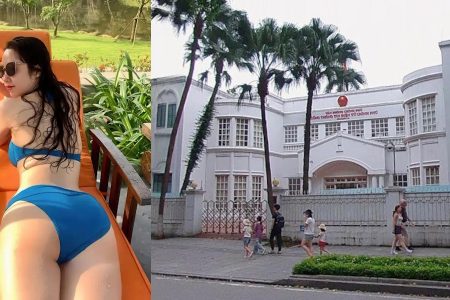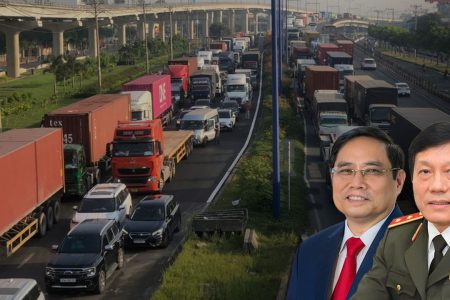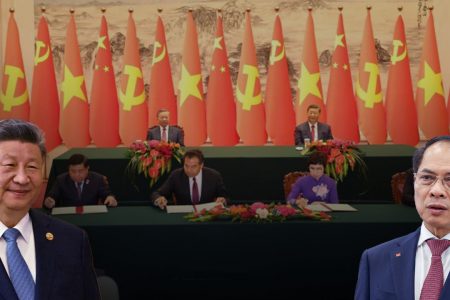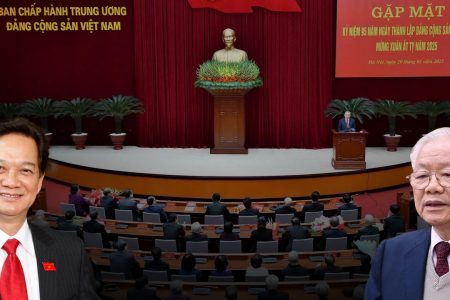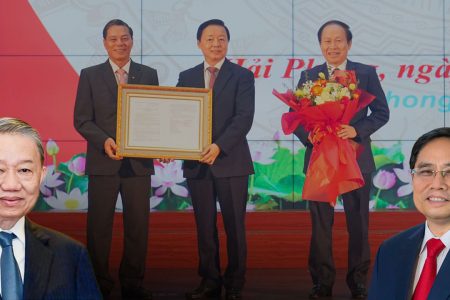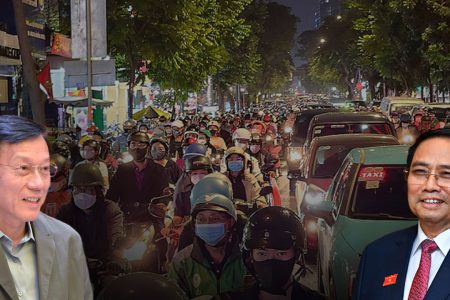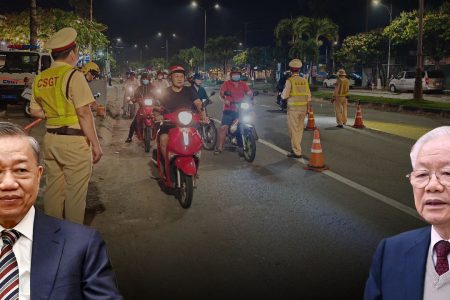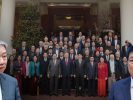
Social networks proved to be effective when more and more cases in which Vietnam’s authoritarian regime has to speak out after information spread on social networks. However, social networks also have limitations when the team of government-supported commentators is also active in the same field.
A few days ago, the Facebook social network spread a video clip about a traffic accident that killed a female high school student on June 28, 2022. People believe that the death is the car driver’s fault but his person is unharmed. Many analyzes by experts in different fields are also written on social networks for everyone to refer to.
On the morning of August 2, the police and the Department of Information and Communications of Ninh Thuan province held a joint press conference in which Colonel Ha Cong Son – Deputy Chief of Police of Phan Rang – Thap Cham City said that the initial investigation showed that the person causing the fatal accident was Mr. Hoang Van Minh – an officer of the Air Force Regiment No. 937. Mr. Hoang Van Minh changed the direction of the car unsafely, leading to an accident that killed female student Ho Hoang Anh, who was riding a motorbike in the right lane and at allowed speed. According to Mr. Ha Cong Son, there are enough factors for probing the case according to the provisions of law.
This is not the first case that the State has spoken out about when the information was spread on social networks. With the pervasiveness of social media, it seems that nothing can be hidden.
For many years, a lot of information that was considered “fake” published by social networks or blogs turned into real news when the state press republished it afterwards. Although just a few days before posting, state media still insisted this was a false rumor. From news of money exchange decades ago to the death of Secretary of the Da Nang Party Committee Nguyen Ba Thanh in 2015; the death of Vietnamese President Tran Dai Quang in 2018; and the information about the epidemic in the past two years, etc.
Mr. Nguyen Van Quang, a person interested in the social situation in the country, commented to RFA about the power of social networks:
“I see in today’s conditions that the Internet has global coverage, everyone can buy themselves a smartphone to read all the information from all sources in countries around the world. However, all those sources of information also need people with a level of awareness and selection, not all of them are correct.
Going into each specific case, it must be said that social networks have a tremendous power, not just a means of entertainment. It reflects all aspects of social life, especially what lies about dishonesty, it will be exposed through social networks.
But the nature of the dictatorial government is to only put up what is good for the regime, and what is unfavorable or refer to their bad nature, they hide. The story of the recent traffic accident in Phan Rang cannot be covered up and has a legal basis. That forces the government to step in, not ignore it. And when involved, they must investigate clearly and answer in public, answer in front of the people even though the previous incident was intentionally covered up by someone. One people cannot use its hand to cover the sun!”
From the past to the present, whenever something deemed “sensitive” happened, the Vietnamese government has always issued a written request to sanction those who spread “falsified rumors,” even though those rumors are later published by the mainstream media.
An example can be given a few months ago related to the case of Mr. Trinh Van Quyet: In May 2021, a young man in Ha Tinh was fined VND 7.5 million ($330) because he used his Tiktok account to announce that Mr. Trinh Van Quyet was arrested a few months earlier. According to state media, this young man was fined for reporting false information, distorting, insulting the reputation of the organization, the honor and dignity of individuals when he posted a video with the information: “Tension! Billionaire Trinh Van Quyet was arrested and detained on charges of fraud and appropriation of property.”
At the end of March 2022, FLC Group Chairman Trinh Van Quyet was probed and arrested for manipulating the stock market, according to Article 211 of the Criminal Code.
It seems that in order to prevent speculation from the online community, after Mr. Trinh Van Quyet was arrested, the Ministry of Public Security directed functional forces to collect and consolidate documents and evidence to handle “all individuals who commit posting false and unverified information, contributing to creating a stable and healthy business environment.”
For Lieutenant Colonel Vu Minh Tri, a former officer of the military General Department 2, social networks are clearly beneficial for people living in dictatorships which always manipulate information, but there are also disadvantages when tens of thousands of government-supported public opinion shapers active at the same time on social networks. He said:
“In Vietnam now there is a fairly common situation, that is, the interests of the State are not consistent with the interests of the people, even contradicting or going against the interests of the people. Therefore, when people give their opinions, sometimes the state will be at a disadvantage, so the regime tries to prevent it.
Secondly, a dangerous thing I feel is that our Vietnamese people’s level of using social networks to understand information is not as good as in countries with a long tradition of freedom and democracy. Therefore, in many cases, people are led by forces that do not represent the people to lead them into things, not focusing on the main point.
We have no association, no organization. The opinion of our people is public but it is a personal opinion, there is no guide, no formal class. Meanwhile, the State has thousands and tens of thousands of trained public commentators who are required to follow one voice so they may still manipulate public opinion.”
Journalist Tran Ngoc Tuan in the Czech Republic commented to RFA:
“So far, the unofficial information that the State calls false, it is very honest, very true, 90% correct, ahead of the mainstream press. The regime thinks such information will damage the prestige of the state, discredit the government, and discredit the law enforcement agencies. People have a funny saying that if you want to hear the right information, go online, if you want to listen to the lies, watch VTV or read Nhan Dan newspaper [of the ruling party].”
Earlier this year, the book “Research on Vietnam’s control of online anti-state publications” by author and researcher Luong Nguyen An Dien was released. According to the author, over the past two decades, the focus on anti-state publication has shaped the way Vietnamese authorities deploy a variety of censorship strategies with the dual goal of creating greater openness ostensibly but maintains tight control over online discussions.
With information on social networks that is judged to be more true than false spreading quickly, the State recently introduced more tightening measures when the Police Department and the Department of Information and Communications of Ho Chi Minh City Minh joined hands to coordinate in the said work to “protect national security, ensure social order and safety, fight against crime in the field of information and communication.”
Thoibao.de (Translated)



